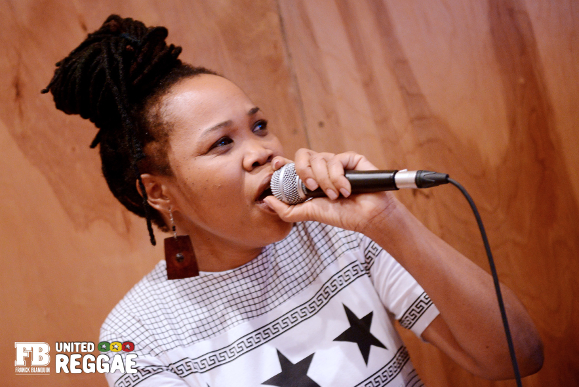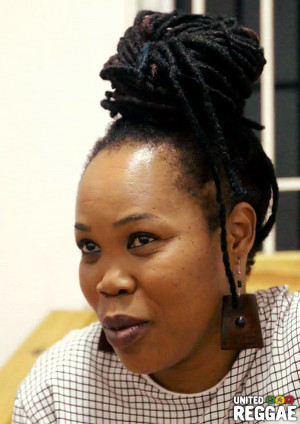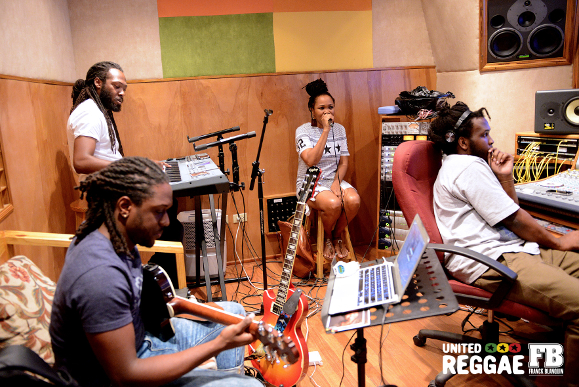Articles about reggae music, reviews, interviews, reports and more...
Interview: Queen Ifrica in Kingston
- Home
- Articles
- Interviews
- Interview: Queen Ifrica in Kingston

Interview: Queen Ifrica in Kingston
"Whatever you're going through, music can fix it"
Sampler
Ventrice Morgan, better known as Queen Ifrica, sits, one leg crossed over the other, on a chair at Jimmy Cliff’s Sunpower studios in New Kingston. She is here to record a song, Good Man, for her new album Climb, due out via VP Records in March. She has agreed to a quick impromptu interview in the studio corridor. United Reggae has no questions pre-prepared, so the conversation just flows.

The song, she says, stems from “the fact that… In relationships a lot of times the women are always comforted for whatever reason and the men are somewhat left out. Sometimes it is taken for granted because of the fact that society benefits from the emotions of the woman as opposed to the emotions of the man. And so his emotions get lost in everything. I am highlighting the fact that ladies should be thankful and know that when they have a good man in their life they should recognise that.”
Feminists might recognise the idea of a society nourished by a woman’s emotional capital – but Ifrica, like many powerful female Rastafarian artists in reggae music, dislikes the term feminism. In an interview with Reggae News in 2009 she described it as “sexist” – a position she stands by still. “I believe in a balance. I think there are women and there are men in this world for a reason. And as a woman, as much as I understand all the ills that women face, I do believe that it is equal on the sides of the men also, from the time of being a boy, growing up depending on the neighbourhood you find yourself in. I think there is a balance to be struck there and so I like to talk from that aspect of the balance.”
The long delay between Climb and her well-received second album Montego Bay in 2009 was partly to allow time for her son Malawi’s formative years. She smiles broadly. “He came around in that time and he is automatically going to be the priority and so a lot of the dragging took place there. But in between, we have put out a few singles and we keep our presence in the business as we go along.”
 I am always on the same path with my messages
I am always on the same path with my messages
Another way in which Jamaican Rasta artists tend to see the world differently from Anglophone rock or pop artists is in terms of how they view creative progression. There is no eagerness to prove they’ve moved on from their last project to a totally different mental space. While the rhythms on Queen Ifrica’s new album may have changed, the message remains the same. “I wouldn't necessarily say different, I would say improved. Because you have to grow. I am always on the same path with my messages in terms of talking about the ills of society and the need for the protection of youth. I will still be touching on those types of topics, probably in a different melody, in a different style, in a different rhythm but the message is always consistent.”
“The album is aiming towards being playful with the message, keeping it fresh because we do, like everybody else, target the youth, because that is where our focus is. We think if their heads are together in the right place with their meditation on a positive path then the future wouldn't look or feel as dim as it does. That is basically how we try to use music from our corner.”
 Ventrice Morgan had a very different upbringing from most youths. She was raised in Rastafari by her mother and stepfather. “A lot of times in the Rastafarian community,” she explains “Women in particular become Rastas because their Kingmen are Rastas so they met and they conform to that type of lifestyle. But I like to brag that I was chosen to be Rastafari by my own calling of His Majesty as an individual.”
Ventrice Morgan had a very different upbringing from most youths. She was raised in Rastafari by her mother and stepfather. “A lot of times in the Rastafarian community,” she explains “Women in particular become Rastas because their Kingmen are Rastas so they met and they conform to that type of lifestyle. But I like to brag that I was chosen to be Rastafari by my own calling of His Majesty as an individual.”
Though her parents weren’t Christian – their daughter’s views differed from theirs in matters of theology. Her mother and stepfather did not recognise the divinity of Haile Selassie – but respected Ventrice’s decision to worship him. “You could understand their reasons. Not wanting to individualise the Almighty, to give him a figure, to give him an image. They would see the creator from the aspect of The Most High, the Supreme Being, the Ever Living Creator Of All Things - not necessarily one that came to Jamaica on a plane. They stopped worshipping Haile Selassie when he came to Jamaica and they saw that he was a regular man. He never had a big beard and big locks. It was like "Okay, that is not the Christ that I have been worshipping. That is not the person I have been visualising as Rastafari.” However, I have no reason to see him as with or without locks because the teachings of His Majesty were enough for me as an individual to see him as greater than just a man.”
 My father is where our music started
My father is where our music started
Ifrica’s birth father is the legendary ska rocksteady and reggae artist Derrick Morgan. Ventrice didn't meet him until she was in her 20s, yet she is still proud of her lineage. “He is where our music started” she beams, referring to his work behind the scenes as an A&R man for Leslie Kong’s Beverleys label “He told Bob Marley to sing. If Jimmy Cliff were here sitting in his place right now he'd be kissing me all over my cheeks because he loves my dad. My dad is responsible for introducing him to the music. They are best friends today. He was the guy who was where everybody went to be auditioned to be seen and to be heard. I am honoured to be called by his name. I am honoured to be from that root.”
Ventrice was born in Spanish Town, and grew up in St Mary before moving to Montego Bay aged nine to live with her mother. Today Montego Bay has a reputation for all-inclusive foreign-owned hotels shutting out the local population from tourist trade. Ifrica says that was not always so. “When I was in Montego Bay in the late 80s and early 90s, from Sam Sharpe Square to a place called City Centre used to have hundreds of tourists in the streets. But what they did was they made all the hotels all-inclusive and took the tourists from the streets and told them it was dangerous to walk in the streets.”
 Jamaicans are not self-destructive
Jamaicans are not self-destructive
“I beg to differ because Jamaicans are not self-destructive. If you give them the infrastructure and you give them somewhere in their community where they know that a ship or a bus with tourists is going to come and they're going to be sold stuff, they are going to be on their best behaviour and be their nicest Jamaican selves. They want their country to be promoted and they want people to come back to their communities. That is the Montego Bay I remember where the regular little man was always benefiting from the influx of a lot of tourists. They need to put them back in the streets because that is where I think tourists want to be. Among the people to understand the culture.”
Earlier, when talking about theological disagreements with her parents, Ifrica praised the culture of loud reasonings in her Rasta community – where everyone can put aside their differences and eat and smoke together at the end of the day. Foreigners sometimes mistake this forcefulness of discussion for anger. “The culture of Jamaica is so fascinating. It is unique in itself, the way people communicate with each other. You could walk outside and hear this loud commotion and it is just people having a good chat! They don't need drinks, they don't need anything, they just have that off the top of their heads.” She laughs. “I am one of those loud conversationalists. But I can also be calm if I want to - especially if I burn some herb. Our energy is at the top at all times and it comes across strong, sometimes to our benefit sometimes not.”
The reasons why Jamaican character is so overproof, she says, stretch back into the island’s brutal colonial history. “I think it's this urge of wanting to show your strength so much. Always being suppressed for whatever reason. The history is so strong in terms of pain and emotions that have never been healed fixed or even been given a rub on the shoulder to say "I know what you went through". So people had to find ways to generate that passion, to make fun of it. If you go into the inner city communities you see people just find stuff in the middle of the mess to make fun of, to feel a part of. It was aimed at easing the pain and then it became something so beautiful that it is used worldwide - in terms of the dance, in terms of the fashion, in time in terms of the style of lyrics, in terms of the style of projection on stage. All of that comes out in just wanting to express that urge of belonging.”

One proposed way of healing the historical wrongs done to the Jamaican people is the continued request for slavery reparations from their former colonists. Ifrica believes that white Europeans and Americans should admit their ancestors’ culpability for slavery – but black people should not see it as the root cause of their suffering. “I think what is needed in this whole thing is honesty where the whole situation is concerned. I'd love to see it on CNN more. I'd love to see it on the BBC more. Where a white voice that has relevance to the world comes out and really says "Slavery was out of place”.”
“Black people on the other hand should accept the fact that it is not okay to just blame slavery as the reason why we can't unite our inner-city communities. It is the greed of mankind that is causing all these problems in the world. We are the only animals that do not do things according to the laws of nature. You can see a lion eat a gazelle because he is doing it according to nature. It is not necessarily our nature to be as violent as we are. I just personally feel that if we start with our kids making them not see colour but see people, see that love that I can feel for you and that love that you can feel for me - I think we can start there.”
Like millions of people worldwide, Ifrica watched the US Presidential Election with interest. Donald Trump may have been the winner, but she was rooting for socialist candidate Bernie Sanders. “It is very rare when people that want power speak from the point of view of people power. I like to see it when an individual comes forward and says "I am speaking on behalf of the people who I see suffering." We need more gatekeepers who are willing to take a chance on a little man or the little woman who really needs that one person in that one moment just to say "I understand what you're going through".”
 I'm a social worker who uses music as a tool
I'm a social worker who uses music as a tool
Ifrica sees a similar role for herself within music: “I think I'm a social worker who uses music as a tool. I love people. I cannot help the emotions that come over me when I see pain. It is not like I have all the answers. But I was chosen I think to do it from this level and that is my passion. I am passionate about using music. [Whether for] a little boy, a little girl, a big woman, a mad person. I have mad fans. Like people who live on the streets and they're like "There is a girl named Ifrica" and he is eating from a garbage can. I am like "Yes" and I will stop and have a conversation because music can resonate with anybody. Whatever you're going through, music can fix it. In any state you are in as long as you're alive. So that is my passion.”
Comments actually desactivated due to too much spams
Browse by categories
Recommended Articles
Latest articles
Recently addedView all
© 2007-2026 United Reggae. All Rights Reserved. Reproduction in whole or in part is prohibited. Read about copyright
Terms of use | About us | Contact us | Authors | Newsletter | A-Z














